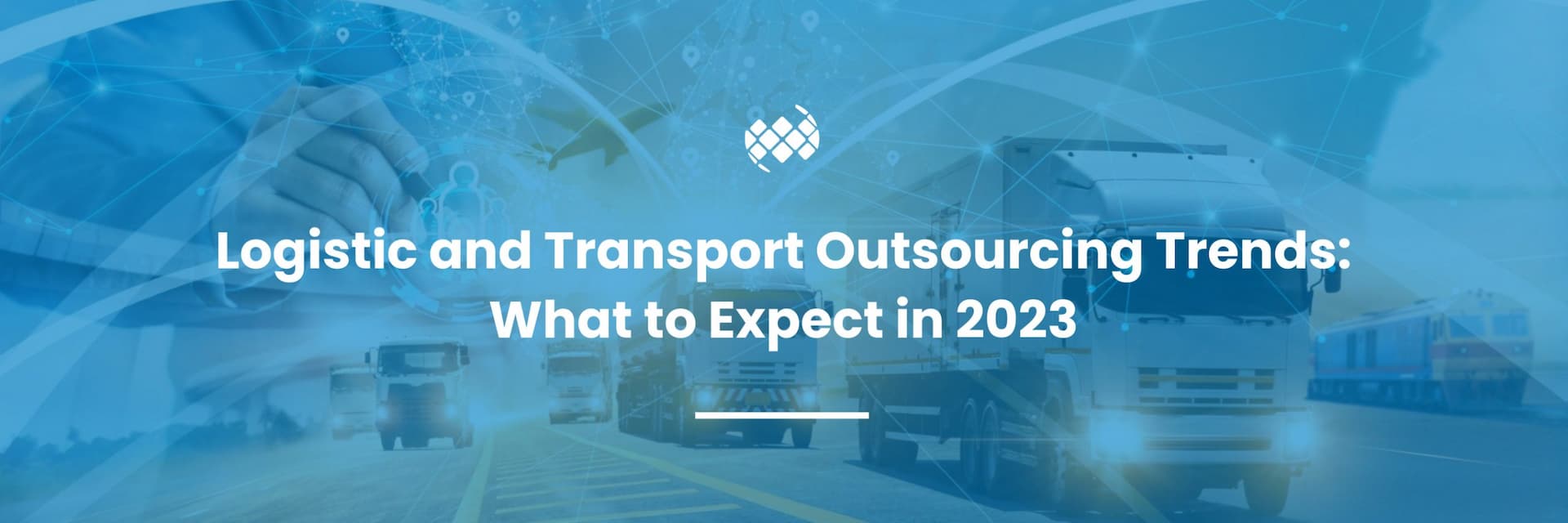
The year 2021 witnessed a decline in global supply chains and shipments due to the COVID-19 pandemic and the ongoing 2022 Russian invasion of Ukraine. However, these challenges have led to a renewed focus on technology and outsourcing as effective solutions for optimizing supply chains and meeting consumer demand. That said, the market for Global Logistics Outsourcing is predicted to increase steadily at a rate of 3.95% and thus reaching a value of USD 79611.92 million by the year 2028.
In addition, the 26th Annual Third-Party Logistics Study made in 2022 reports that shippers and their third-party logistics (3PLs) providers are still experiencing benefits from their partnerships. They have successfully tackled challenges such as demand’s unpredictability, capacity issues and market uncertainties. An overwhelming majority of shippers (89%) stated that their relationships with 3PLs have been successful, while an even higher percentage of 3PLs (98%) confirmed that their customer relationships have, likewise, been successful. Furthermore, 73% of shippers who use 3PLs and 90% of 3PL providers concur that 3PLs offer novel and innovative methods to enhance logistics efficiency.
This article will examine the major trends in the logistics industry for 2023, their current impact, and their potential to shape the industry in the future.
1. Most Commonly Outsourced Activities in Logistic and Transport
The outsourcing of transactional, operational, and repetitive activities continues to be the norm. The most commonly outsourced activities include domestic transportation (67%), warehousing (63%), customs brokerage (46%), international transportation (44%), and freight forwarding (49%). The IT Gap has not seen much change, and 94% of shippers believe that IT expertise is a crucial component of 3PL capabilities. More than half of shippers (58%) are content with their 3PLs’ IT capabilities.
2. Impact of Covid-19 on Logistic and Transport Outsourcing
The COVID-19 pandemic emphasized the importance of effective outsourcing transportation and logistics, as well as the need for companies to be prepared for major disruptions in the future. In the survey conducted by the 2022 Third-Party Logistics Study, both shippers and third-party logistics (3PLs) reported similar impacts, with 29% of each group citing a net negative financial impact from the pandemic.
3PLs reported logistics bottlenecks and backlogs in all areas of the supply chain, and roughly half (48%) said the pandemic had a net negative impact on operations and volume capacity. However, 30% of shippers and 23% of 3PLs reported a net positive impact.
Overall, the pandemic has highlighted the need for contingency planning and risk mitigation strategies. 3PLs indicated they were better prepared to face a major disruption than shippers. More than half of 3PLs (55%) reported that they were somewhat prepared with a level of readiness plan in place prior to COVID-19, and 25% said they were prepared with a readiness plan in place. Among shippers, 43% said they were somewhat prepared, and 18% said they were prepared.
Shippers and 3PLs are enhancing their readiness and continuity planning, with the top areas of improvement including data analysis and visibility, labor management and scheduling, domestic transportation and logistics, warehouse distribution and operations, demand forecasting, capacity forecasting, international transportation and logistics, and supply chain network design or redesign.
3. Sustainability and Environmental, Social and Governance (ESG) Programs
The concept of sustainability has become a key focus for many industries, including logistics, transportation, technology, finance and outsourcing. Sustainability efforts in these industries aim to reduce their environmental impact, promote workplace fairness and diversity, and contribute to a better future for all. In fact, many companies, such as Sourcefit, have been recognized for their sustainability efforts, receiving awards and certifications such as the Corporate Social Responsibility Award and Great Place to Work Certification.
According to the Third-Party Logistics Study, the primary motivators for ESG initiatives are influenced by consumer behaviors and preferences as well as environmental and climate effects, with diversity, equity, and inclusion (DEI), and social contribution and responsibility following closely behind.
About 59% of shippers and 51% of supply chains reported having established ESG programs with defined goals and objectives. Although cost is the most significant challenge in implementing an ESG program, only 8% of shippers and 8% of providers perceived an inability to validate ROI improvements. In addition, garnering support from others across the supply chain is a challenge for 46% of shippers and 30% of providers. The areas of the supply chain that have made significant progress in ESG are sourcing and procurement, supplier management, manufacturing, transportation, and warehousing.
There is also a growing concern in the Logistic and Transport Industry about reducing carbon emissions and adopting greener production and distribution methods. This trend has led to the emergence of electric vehicles (EVs) that emit zero harmful greenhouse gasses. Additionally, warehouses are also investing in sustainable pallets through processes such as kiln drying and heat treatment, which make pallets more stable and durable. Heat treating wood, for example, can help cut long-term costs on pallets.
4. 3PL Technology
Outsourcing logistics to 3PLs who invest in emerging technologies such as 5G, real-time data transmission, internet of things technology, cloud-based systems and data analytics can provide shippers with added value and increased efficiency in their supply chain management.
5G and Real-time Data Transmission
5G technology is transforming logistics and transport processes by providing seamless communication and collaboration between all parties. Real-time data transmission through 5G enables real-time tracking of inventory and shipments, helping to prevent overstocking, understocking, or inefficient routing that leads to waste and increased carbon emissions. This optimization leads to improved sustainability throughout the supply chain. 5G also streamlines processes, reducing unnecessary travel and transportation to further reduce the carbon footprint.
In addition, real-time data helps operators detect and respond to issues and opportunities, improving the efficiency and effectiveness of their operations. By having access to real-time data, operators can detect bottlenecks, delays, or other issues impacting their supply chain and take corrective action, such as rerouting shipments, adjusting inventory levels, or changing production schedules. Real-time data can also help operators identify opportunities to optimize their supply chain, such as by consolidating shipments, using more efficient transportation modes, or adjusting inventory levels to reduce waste. These actions, taken in real-time, improve the efficiency and effectiveness of operations, reducing costs and improving customer satisfaction.
Internet of Things
The Internet of Things (IoT) technology is becoming an increasingly popular investment for shippers and 3PLs as it offers a range of benefits that can improve operations and help create a competitive advantage in the market. One of the main advantages of IoT is the ability to improve workforce productivity by enabling real-time decision-making. By equipping employees with IoT devices such as wearables, they can access data in real-time, helping them make informed decisions quickly and efficiently. For example, wearable devices can track workers’ movements and provide them with important information in real-time, such as the location of a product or the status of an order.
In addition to improving workforce productivity, IoT technology can also improve customer satisfaction. By using IoT devices to track shipments, shippers can provide their customers with real-time updates on the location and status of their orders, creating a more transparent and efficient supply chain. This can also help reduce the number of customer inquiries and complaints, improving customer satisfaction and loyalty.
Furthermore, IoT technology can help shippers and 3PLs create a competitive differentiator in the market. By investing in IoT, companies can differentiate themselves from their competitors by offering unique and innovative solutions that improve efficiency, reduce costs, and provide better customer experiences. For example, IoT technology can be used to track inventory levels in real-time, ensuring that products are always available when needed and reducing the risk of stockouts or overstocking.
Cloud-based Systems
Cloud-based systems, specifically transportation management systems (TMS), have become increasingly popular among shippers, logistics providers, and trade participants.
In 2019, the worldwide market for transportation management systems was worth $5,467 million, and it is expected to grow at a compound annual growth rate of 9.6% from 2020 to 2027, reaching $11,367 million. These systems offer a centralized platform for managing various aspects of transportation and supply chain operations, including planning, execution, and monitoring. With a TMS, organizations can automate manual processes, optimize routes, and reduce costs while improving the overall efficiency of their operations.
As the adoption of cloud-based systems continues to grow, investment plans are increasingly focused on technologies such as robotics, autonomous forklifts, wearables, and data analytics. Robotics and autonomous forklifts can help organizations streamline and automate various tasks, such as order picking and warehouse management, reducing the reliance on manual labor and improving accuracy.
Wearables, such as smart glasses and wristbands, can provide workers with real-time information and data, enabling them to make better-informed decisions and work more efficiently. For example, a worker wearing a smart glass can easily scan a barcode and receive instant information about the product, including its location in the warehouse and the quantity available.
Data Analytics
Data analytics is playing a significant role in enhancing supply chain management in logistics industries. This modern technique is being utilized to improve the performance of logistics processes. By tracking the supply chain and monitoring shipments promptly, data analytics provides operational services that enable efficient supply chain management. It offers clear monitoring of products, keeping a record of the data from the shipment point to the final delivery time.
Route optimization is another critical aspect of logistics where data analytics plays a vital role. By using multiple methods such as GPS, weather tracking, and peer-to-peer data, data analytics finds the best route for product delivery. It helps to understand the condition of the route and manage the delivery accordingly. Data analytics checks the process of data and takes necessary actions based on the data insights.
Data analytics also enables production analysis and efficient enhancement. It monitors key performance indicators to constantly improve logistics procedures, indicating delays, checking for missing items and broken products during shipments. By predicting product demand and enabling logistics insight for price fluctuations, data analytics helps companies enhance employees’ productivity and improve logistics performance.
Furthermore, data analytics plays a crucial role in forecasting logistics and operations. It works as a digital platform to enhance the level of productivity in logistics industries, upgrading the demand of the supply chain and handling the connectivity network. It helps to improve the solution of the supply chain and brings enhancements to the logistics industries.
Finally, data analytics in logistics industries assists in optimizing the cost of shipments and offers better management for the operations. It helps in processing data governance to enable the strength and integrity of supply chain management. As digitalization empowers logistic businesses, data analytics enhances productivity and optimizes services, making it a critical component in the logistics industry.
To learn more about outsourcing, you can read our Top 8 Qualities of an Outsourcing Company in the Philippines article. We invite you to follow us on social media and to visit our website to learn more about our services.

Latest Awards
Sourcefit’s commitment to excellence has been recognized through numerous industry awards and certifications.
We recently received the Fortress Cyber Security Award from the Business Intelligence Group. Sourcefit was also honored with the prestigious recognition of Best Outsourcing Solutions Provider in the Philippines during the 2023 Business Excellence Awards.
Other awards include: FT ranking of 500 high-growth Asia-Pacific, The Marketing Excellence Awards, Inquirer Growth Champion, HR Asia Awards, among others.
Related Articles
- Outsourced Lawyer and Paralegal Support Trends that are Shaping the Industry
- Unlock Growth Opportunities this Year with Finance Outsourcing
- This Year, Gain Competitive Edge with Back Office & Medical Billing BPO
Popular Posts
-
- Guide to Banking BPO, Financial Services Outsourcing
- Finance & Accounting Outsourcing (FAO): Overview and Related Outsourced Services
- Women in Outsourcing Companies
- Definitive Guide to Technical Support Outsourcing & Offshore IT Services
- 5 Keys to Improving Quality in Offshore Business Process Outsourcing
Not sure where to start? Connect with us and see how Sourcefit can help you grow your business.














